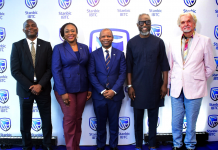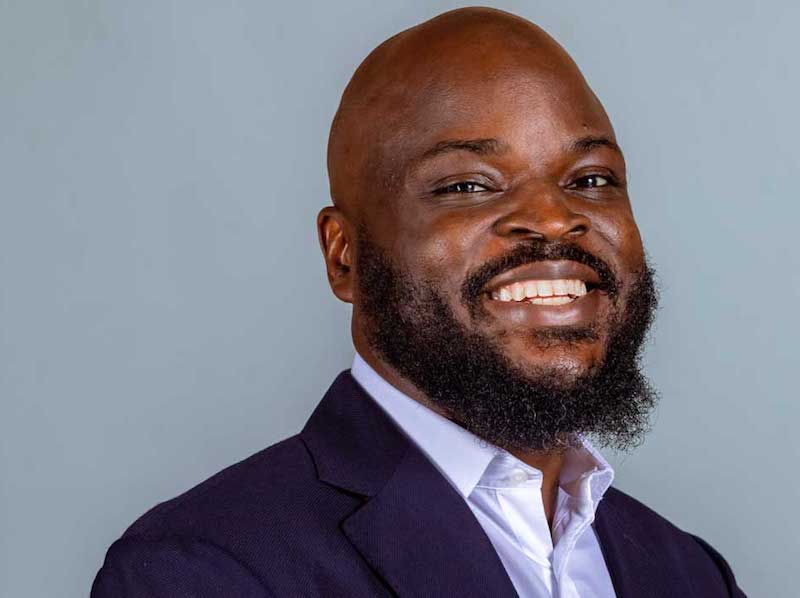Idris Olorunnimbe is the Group Chief Executive of The Temple Management Company and a member of the company’s board of directors with more than 15 years of industry leadership, entertainment expertise and executive management experience. Under his watch, Temple has quickly established itself as an innovative and visionary leader in African sports and entertainment.
You are known for your impact in the creative sector, what actually influenced your interest and why are you so passionate about driving change?
At the beginning, people thought that it was a wrong move, and that it would be a waste of time because the sector wasn’t ready for serious business. There was only one question that I asked and after the question, their perspective always changed. The question was that, ‘Can you imagine the English or the American economies without the impact of entertainment and sports?’ That’s the potential of what we’re sitting on with our creative industry.
I mean, when we say entertainment, a lot of people always pretend sports is not part of entertainment but I belong to the school of thought that sport is the greatest form of live entertainment. So, when I say entertainment, sport is also captured. I think the fact that as a country with over 100 million people, with a population of more than 50 per cent of that, and the world has a demand that we cannot satisfy for, for content and for entertainment. There’s only one thing to do, let’s equip as many people as possible to be able to get into that space by providing what the world needs..
The first time I saw your studio, I was amazed. I initially thought it wasn’t in Nigeria, until I read that it was right here in Lagos. What made you put up something that big?
It is solely based on the foundation it’s built on – to be proudly Nigerian. Every time we go abroad to have meetings or work together, one of the excuses they
usually give is that there are no facilities in Nigeria. This was always very, very painful to hear because I’ve never been to a meeting anywhere in the world and seen people whose brilliance cannot be matched by the brilliance that we have at home. The simple thing to do is to have our own. When we have our own, we’re not going to be measured by any standards other than this, the global standard for excellence. Excellence does not have two variants; it is only one and it means the same thing everywhere in the world. Therefore, we thought that with the quality of talents that we have in Nigeria, with the potentials that we have in the sector, it was only proper that we have our own and we are proud to say that we will deliver them with Ogidi Studios, which would compete with anything like it anywhere else in the world. When the history of the Temple Company has been written after we are gone, it would be said that we are the ones that did it.
You recently entered a partnership with the Lagos State government on a training academy, which is commendable. How far is the partnership going and what are the processes?
I mean, for this one, I think that it is right that we commend the government of Lagos State, because you see if from where I’m sitting based on the research that we have done, and based on our experience, with what is obtainable in other parts of the world, we have two deficits. First is the infrastructure deficit that we have tried to bridge with Ogidi, and we’ll continue to bridge with the students that we are going to design and implement as we go forward.
Second is the skill deficit, which the Ogidi Creative Centre in partnership with the Lagos State government is tailored to address. States like Georgia, in the United
States of America, Toronto in Canada, have different incentives that they have put in place for productions. An example is that when you go there, you get significant tax breaks.
In our case, there are two things that we need to be able to put that together. One of it is to increase our pool of skilled labor across the entire value chain by not just having brilliant directors, but also have brilliant line producers, outstanding gaffers, amazing sound designers, and so on in the movie industry.
So based on our population of 200 million people, the number of people that we currently have, that have the skills that can compete with their counterparts in other parts of the world is very minute. So we therefore have to meet, recruit and increase the pool of talent, which is what the Gidi Creative Centre is addressing. In the entire industry, I can see that Temple is the only one that’s addressing the deficits on both sides, infrastructurally and skillfully, so between both of them, there’s a convergence.
With enough infrastructure and skilled talents, the industry will truly take off the way that we imagine and it would be able to get the kind of national patronage that would knock the millions of Dollars, Pounds, Euros and all the international currencies.
Talking about patronage, when you’re done with this training for your students, are there plans for continued mentorship and recommendations for jobs and opportunities?
Oh, yes, there is already. For the training, we have two partnerships – Henley Business School, University of Reading, UK and the other with the
University of Lagos. Now, what is best expressed as a good part of the training includes business acumen and entrepreneurship. So, we understand
that it is not about just being able to acquire a special skill, your mindset is as critical to your success as the talent or the skill that you possess, so that is being addressed.
Now when they finish, these are our first sets, so they are pioneer sets. The people who will be trained will also belong to an alumni that they are leading and they are also part of the Henley Alumni. This gives them access to the entire alumni of the Henley Business School across the world which gives them access to talents, access to mentors, like you mentioned, and it also gives them access to materials.
On our end, part of what we have done is that the Lagos State government, through the Lagos State Film Board, led by Mrs. Adebukola Agbaminoja, have grants that our graduates can access. The Lagos State Ministry as well as the Ministry of Tourism, Arts and Culture, also have grants and loans that are available either through the Ministry or through the Lagos State Employment Trust Fund. Part of the problem with accessing it is the fact that to ascertain your level of competence as a startup is difficult. What we get from this training, either as an individual or as a group, because we were teaming them in groups, so that if somebody writes, some people who have learned filmmaking, some who have learned some design can come together, to create and develop a short film or a series. Now, those guys as a group would be able to apply with the certificate that will be issued or recognized by the ministry and by the Lagos State government.
Access to finance is important, what it also does, is that we we’ve been talking and we’re designing the fund that will be privately owned and privately managed. It means that when that comes on stream as well, you can access it based on the fact that we know that the certificate thatyou’re taking away from the Gidi Creative Centre is not just a piece of paper, we also have access on the back end to know how you did in terms of how seriously you took your work, you’re disciplined in terms of punctuality, and more. So these are the tools used to evaluate applications around the world and we’ll be able to use those tools as well. We had over 1000 applications and currently have 200 trainees who are part of the full time program, the online masterclasses were designed to accommodate another 300 to 1000. So, ultimately, there will be 200 people who have gone through the rigors of a three month program, and another at least 300 that would have been able to take a masterclass, or more from the best in the game across the different disciplines.
So does your curriculum include content creation given that it’s become a cash cow for content creators?
Yes, we recognize the importance of content creation as a lever for creatives and this is why it’s woven into the fabric of all ten training courses.
Ultimately, all of us are content creators, depending on what part of the content to fill. in the case of a fashion design, for instance, his input will be needed for films for gaming, the services of a sound designer will be needed the same way as that of a filmmaker.
You were recently at TIFF, what were the lessons learnt that we’re not doing yet and we should be doing?
TIFF for me was an eye opener and validation in a way of some of the things that I knew. I mentioned earlier the importance of skill development and infrastructural development and one of my takeaways from Tiff is that the Toronto Film School graduates 1000 people every year, and their courses ranges from three months to one year to 18 months to three years.
What that gives us is that every year, they have a minimum of 1000 more people that are launched into the creative industry through rigorous trainings and so wehave decided, and it helped us to also redesign some of our courses. For instance, before this class, a lot of the trainings in music production and audio production that I had seen… I mean, I don’t enter everybody’s classrooms, but from what is shown on social media, it looks as though there is an unstructured instructional process. For instance, all trainees sharing the same system with their facilitator.
One of the things we noticed was that they are like labs where everybody had a system of their own. I don’t know what the technical name for the device is. But it’s like a beat maker. It has the keyboard, and some other tools that are used to make music and to make design audio. Immediately we came back, we redesigned our program. And what we saw there is what we’ve been implementing- a classroom of people who do the learning, audio module, sound design, and audio engineering.
At the moment, quite a few people think Nigeria is too far. What I said to them was that the distance from Lagos to Toronto is the same distance from Toronto to Lagos. So it’s too far, because you are not aware of everything that we have and so we’re going to continue working. We’re willing to, in fact, double our efforts to ensure that we give you 1000 reasons to think next door. One of the ways is what I mentioned to you regarding deficit in hiring infrastructure.
Part of the conversation also is for them to know that Ogidi is already working with or we’ve already been patronised by the big platforms like Netflix and Amazon. Unfortunately, I cannot disclose because we signed an NDA, but permit me to mention that the soundtracks of one of the biggest movies that’s going to be released in the world, was produced in Ogidi Studios because they found out that was the place where they had the kind of infrastructure they needed. For about two weeks, all our studios were locked down. They had the best of Nigerian talents and other African countries and a couple of people from their studio in the United States come to our workshop to create the soundtrack.
Facts about Idris
Under his leadership at Temple so far, the company has produced movies like ‘Introducing the Kujus’ and ‘My Village People’ which are part of the Top 100 movies in the Nigerian Box Office.
Over the years, Temple has solidified its position as an industry leader by launching Ogidi Studios, West Africa’s foremost creative production complex. Ogidi has already yielded several movies, TV shows, documentaries and award-winning music.
Culled from Thisday















































